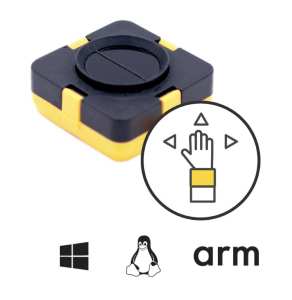
Check out ST’s CES Complement Event, from January 12 to January 14. Discover the agenda, and register to take part in it.
During this time of global pandemic, Terabee, a French company and member of the ST Partner Program, will showcase Time-of-Flight (ToF) modules that can help people social distance, monitor room capacity to reduce over overcrowding, and prevent physical interactions with hard surfaces by facilitating the creation of touchless systems.
The company will present its Evo ToF products at our CES Complement Event. All models in the series use an STM32F4 as a host MCU. Additionally, the Evo Swipe, Evo Mini, and Evo Swipe Plus also use ST’s VL53L1X, one of ST’s longest-ranging sensors at up to four meters. In a nutshell, Terabee took components and created products that handle many of the complexities behind ToF systems. Engineers have, therefore, a lower barrier to entry thanks to Evo products that bypass the challenges inherent to ToF applications. We thus sat down with Greg Watts, Marketing Director at Terabee, to learn why the company chose ST components and how the Evo series came to be.
Underlying Hardware Challenges and Solutions

One of the engineering feat from Terabee is that the company managed to keep its modules small. The Evo Swipe itself measures 29.6 mm x 29.6 mm, and it only demands 42 mm x 30 mm x 13 mm, backboard included. The backboard uses an interchangeable clip-on mechanism and houses the interface. Current models offer USB, UART, or PWM, with Ethernet and wireless capabilities coming soon. The small size of Evo products also means that they fit in touchless elevator panels, digital signage, and more. As Greg explained,
“Accuracy remains one of the biggest challenges behind ToF applications. For instance, it’s crucial to come up with a cover glass that lets enough light through while resisting scratches. Size is also essential to remain inconspicuous. The sensor module must be discreet to avoid distracting or confusing final users. Evo products ensure that customers can fully take advantage of the ST components they house while remaining easy to use and integrate.”
It was thus fascinating to see that Terabee overcame these challenges thanks to their expertise and ST components. The range of the VL53L1X is fundamental in these situations. The low-power mode of the STM32F4 keeps devices small while offering enough computational throughput. And the know-how Terabee accrued around ToF modules now means engineers have a device ready for implementation without needing to spend months or even years in R&D.
Terabee’s Testing Protocol
Another critical aspect that engineers must consider when using a ToF module is the idiosyncrasies of their applications. Not all point-of-sales, touchless interfaces, or people counters are alike. Environmental, situational, or technical considerations can have tremendous impacts on the final product itself. As a result, another important aspect of Terabee’s operation is its testing capabilities. As Greg shared, the French company brings comprehensive benchmarking protocols and extensive customer care to the ST Partner Program. There can’t be surprises once the device is in the field, and the smallest thing, like a change in ambient light, can have tremendous repercussions. Terabee’s familiarity with ST MCUs and ToF sensors is thus vital. Indeed, their knowledge of modules and how they react to environments means their engineers can rapidly adapt to customers’ demands to optimize the final solution.
ST and Terabee: Reducing the Time to Market with Expertise
Terabee’s Added Value: Developing Smarter and Faster
Greg reminded us that, at its heart, Terabee remains platform agnostic, which makes their presence in the ST Partner Program even more interesting. As he explained,
“The hardware we, as a company, choose to include in our solutions must enable us to offer significant added value. Our ultimate goal is to bring solutions that ensure engineers can release their products to market faster. This means being able to provide extensive expertise on all components that make up the Evo product. Terabee must also be able to offer competitive pricing, licenses for high volumes, and custom development tools to assist customers.”
One example that Terabee shared was their team’s ability to use ST development tools to rapidly gain knowledge of our devices and launch extensive performance analyses. In the case of the Evo Swipe Plus, the French company offered a competitive advantage because their internal teams could focus on differentiating features rather than on how to get the sensor working. Instead of simply trying to do everything from scratch for the sake of it, engineers must find the “smart balance” between using available industry tools while focusing on creating innovations that no one else can provide.
Building on Previous Experiences With ST
Recent events are also requiring that companies market products faster. As engineers look to offer solutions in response to the global pandemic, time is of the essence. As a result, using an Evo module will vastly hasten developments compared to a solution designed from scratch. Terabee itself is also very sensitive to such considerations as their designers must rapidly meet new demands. For instance, Greg shared how his teams are already experimenting with the latest ST ToF sensors. Indeed, part of what makes Evo products appealing is that engineers can immediately benefit from the years of partnership between ST and Terabee.
One interesting example comes from the development of the Evo Swipe. Since Terabee was previously using a ToF sensor from another manufacturer for other products, switching to the VL53L1X was going to be a challenge. However, thanks to their familiarity with ST tools, their close relationship with our engineers, and the pin-to-pin compatibility of the ST sensor, the French company rapidly released an entire new line of Evo Swipe products. In turn, this close partnership behind-the-scenes now enables Terabee clients to ship their final product sooner.
Click Link: https://blog.st.com/terabee/






